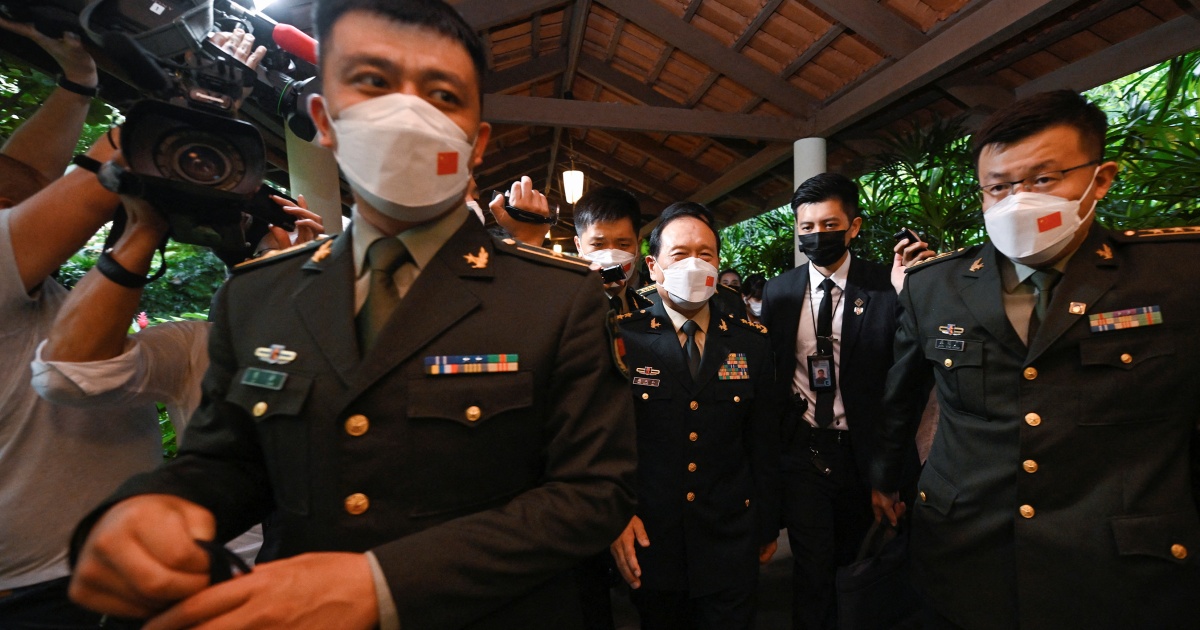‘Smash to smithereens’: China threatens all-out war over Taiwan
Defence minister warns his US counterpart China will ‘not hesitate to start war’ if self-ruled island engages in ‘independence plot’.
China will “not hesitate to start a war” and “smash to smithereens” any Taiwan independence efforts, its defence minister warned his US counterpart in the pair’s first face-to-face talks.
“If anyone dares to split Taiwan from China, the Chinese army will definitely not hesitate to start a war no matter the cost,” Defence Minister Wei Fenghe said during a meeting with Lloyd Austin on Friday.
“The PLA [People’s Liberation Army] would have no choice but to fight … and crush any attempt of Taiwan independence, safeguarding national sovereignty and territorial integrity.”
Despite the combative words, Wei said the talks with Austin “went smoothly”.
The meeting took place on the sidelines of the Shangri-La Dialogue security summit in Singapore for nearly an hour, double the time initially allotted.
The Chinese minister also pledged that Beijing would “smash to smithereens any Taiwan independence plot and resolutely uphold the unification of the motherland”, according to the Chinese defence ministry.
“Taiwan is China’s Taiwan… Using Taiwan to contain China will never prevail,” it said in a statement.
‘Operational behaviour’
Beijing claims self-ruled Taiwan as its own and has not ruled out the use of force to take control of the island.
Austin told Wei that Beijing must “refrain from further destabilising actions toward Taiwan”, the Pentagon said.
An American official, speaking on condition of anonymity, said most of the meeting focused on Taiwan and Austin reiterated Washington’s position on Taiwan was unchanged, while criticising China’s “military aggression”.
“The United States has major concerns about increasing PLA behaviour, particularly unsafe, aggressive, unprofessional behaviour and is concerned that the PLA may be attempting to change the status quo through its operational behaviour,” the official said.
A Chinese fighter aircraft dangerously intercepted an Australian military surveillance plane in the South China Sea region in May, and Canada’s military accused Chinese warplanes of harassing its patrol aircraft as they monitor North Korea sanction evasions.
Austin and Wei’s first face-to-face meeting comes as US President Joe Biden is seeking to spend more time on Asian security issues after months of focus on Russia’s invasion of Ukraine.
Although both sides say they want to better manage their relationship, Beijing and Washington remain at odds over several volatile security situations, from Taiwan’s sovereignty to China’s military activity in the South China Sea and Russia’s invasion of Ukraine.
The United States is Taiwan’s most important international supporter and arms supplier, a source of constant friction between Washington and Beijing.
In the latest arms package, the US announced on Wednesday the sale of parts for Taiwanese naval ships at an estimated cost of $120m.
During the meeting, Wei told Austin the sale “seriously undermined China’s sovereignty and security interests”, according to state broadcaster CCTV’s military channel.
China has increased military activity near the island in recent years, claiming the moves are a response to what it calls “collusion” between Taipei and Washington.
‘Authoritarian expansionism’
Meanwhile, Taiwan’s President Tsai Ing-wen said her country is determined to defend itself and is confident this resolve will “rally fellow democracies to our cause”, pledging not to bend to pressure.
Taiwan says only its people have the right to decide the island’s future. Its government says while it wants peace with China, it will defend itself if necessary.
Tsai said Russia’s invasion of Ukraine has shown again “these regimes” will stop at nothing in the pursuit of expansionist goals.
“As we watch images from half a world away of atrocities committed against another democracy on the frontlines of authoritarian expansionism, I would like to stress that, like Ukraine, Taiwan will not bend to pressure,” she added, without directly mentioning China.











